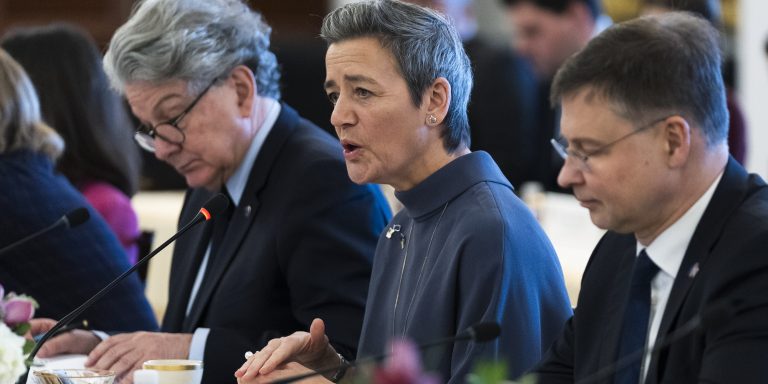INTELBRIEF
February 1, 2024
IntelBrief: Is the European Union Ready to Address the Challenges Confronting its Economic Security?

Bottom Line Up Front
- Against the backdrop of mounting global insecurity, disrupted supply chains, industrial espionage, and strategic competition, the European Commission revealed its economic security package on January 24.
- Stemming from the June 2023 European Economic Security Strategy, the economic security package outlines five initiatives to improve economic security, including tightening regulations around foreign direct investment screenings and developing a standard risk assessment methodology for outbound investments.
- Economic security measures have long been a pain point for the EU, with national security remaining the primary responsibility of each Member State.
- The upcoming EU parliamentary elections, as well as the outcome of the 2024 U.S. presidential election, add additional political challenges to how the European bloc decides to manage economic security challenges internally and how it deals with China.
The European Commission released its new economic security package last week, which includes a range of concrete initiatives to redress economic security issues stemming from the proliferation of geopolitical tensions globally and the rapid pace of technological innovations with dual-use applications. The package unfolds from the European Economic Security Strategy adopted by the European Commission and High Representative of the European Union for Foreign and Security Policy Josep Borrell last June. The Strategy was prompted by the dangerous interdependencies exposed during the COVID-19 pandemic, which disrupted global supply chains, as well as the Russian invasion of Ukraine, which led to a frantic scramble for energy diversification. The European Economic Security Strategy aims to harmonize the bloc’s various economic security initiatives and to plan collective solutions to economic threats emanating from geopolitical conflict and technological advancements while also preserving economic openness and innovation. The document released in June highlights four risk areas: supply chains, critical infrastructure security, technology security, and economic coercion. The risk categories are aligned with the EU’s growing concern about outsized Chinese influence in these areas, which has not only led to the Global Gateway initiative to counter China’s Belt and Road Initiative, but also EU Commission President Ursula von der Leyen’s call for “de-risking from China” last March.
The new economic security package was released amidst increasing global insecurity, disrupted supply chains due to the escalating conflict in the Middle East, and both industrial espionage and strategic competition in areas of critical emerging technologies. Stemming from the June 2023 European Economic Security Strategy, the new economic security package released promotes competitiveness, safeguards against economic security risks, and fosters global partnerships through five concrete initiatives: enhancing regulations related to the screening of foreign direct investment (FDI), starting coordination on export controls for dual-use technologies at the EU level, developing a common risk assessment methodology for outbound investments in critical technologies, promoting research and development in dual-use technologies, and improving research security at the national and sector levels to avoid espionage and access by malicious actors. Since Russia's invasion of Ukraine, the EU has rapidly built up an arsenal of economic tools to punish adversaries, including an extensive sanctions regime targeting Russia. However, a broader and integrated vision of the bloc's economic security was long overdue. Some experts, including senior economist Sander Tordoir at the Centre for European Reform, have criticized this latest economic security package as too reliant on the often tried “soft coordination” of the EU at a time when more aggressive coordination between Member States is necessary to counter the economic security threats posed by China properly.
Tensions tend to emerge when the EU is involved in economic issues that are directly or indirectly linked to the national security of Member States. While Article 4, Paragraph 2 of the Treaty of the European Union stipulates that “national security remains the sole responsibility of each Member State,” Article 207, Paragraph 1 of the Treaty on the Functioning of the European Union states that “common commercial policy shall be based on uniform principles.” This renders economic security coordination a severe pain point for the EU and has sometimes led to the fragmentation of security initiatives that harm the bloc and individual Member States. Before 2019, no EU-level initiative to screen FDI existed. While the EU established a framework for screening FDI into the bloc on security and public order grounds, the framework remains non-binding, and implementation lags in some Member States. As economic security and national security become intricately intertwined in a globalized world dealing with various regional conflicts, it will be crucial for the EU to identify a method to integrate these issues into one legal framework and one security strategy.
With both the EU elections and the U.S. presidential election approaching, multiple political considerations are also at play while the bloc considers its economic security. For example, in his interview with Euractiv, Tordoir posits that the European Commission seemed to have scaled back its proposals for greater centralization in its economic security efforts, comparing the January package to the June strategy. He suggested that this shift might have been influenced by the upcoming 2024 EU parliamentary elections, speculating that EU Commission President Ursula von der Leyen may be exercising caution to avoid jeopardizing the economic security strategy of Germany, given its significant trade ties with China. Additionally, in the case of a victory for Donald Trump in the 2024 U.S. presidential election, the EU may be forced to deal with the United States, opting for a far more assertive stance toward China and potentially requiring allies to act similarly. This may further pressure Europe to abandon its country-neutral economic security package that only mentions China once.